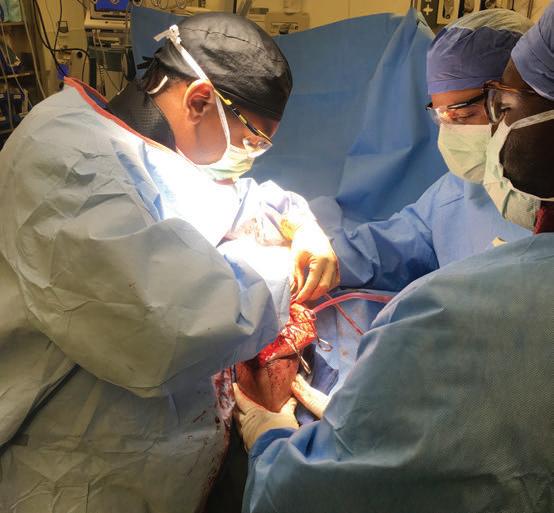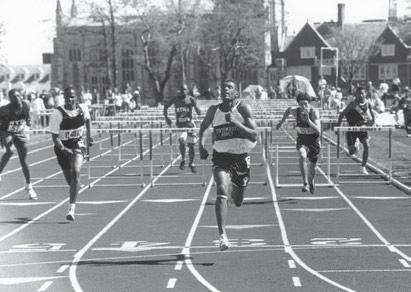
8 minute read
Dr. Milton Little ’99 by Lori Ferguson
Dr. Milton Little ’99
It’s no exaggeration to suggest that Dr. Milton Little began preparing for a career as a caregiver while still a little boy. Now an orthopedic trauma surgeon, Little says the allure of medicine reaches back to childhood.
“My maternal grandfather, Dr. Thomas Bass, was one of the first black physicians to own his own practice in Ypsilanti, MI, and as a child, I lived with my grandparents for a time,” he explains. “I met all the people my grandfather interacted with and saw firsthand his deep commitment to his patients – he would see people regardless of their ability to pay and delivered hundreds of children in town.” Both grandparents were active members of their community and strong supporters of the Civil Rights movement, Little continues. “My grandmother – a bilateral amputee with her own health challenges – gave back to the community through years of service as a middle school teacher and Girl Scout leader,” he recalls proudly. “Witnessing their commitment to others helped me see what’s possible and how you can impact the world.”
Milton wins the hurdles in the New England Track & Field Championship
Ready for Prom, from left:, Jason Miller ’99, Konah Duche ’99, Brian Doyle ’00, Brandon Respress ’98 and Milton
Today, Little is making a mark on his own community as a staff surgeon, assistant professor, and Director of the Orthopaedic Trauma Fellowship at Los Angeles’ Cedars-Sinai Medical Center. And he credits his time at Portsmouth Abbey for helping him to achieve his goals.
Strive for excellence
Looking back, Little says his arrival at Portsmouth Abbey was somewhat fortuitous. He first learned of the School while an honors student at Walter Reed Middle School in North Hollywood, CA. “Our assistant principal reached out to a group of students he viewed as good candidates for East Coast boarding schools and arranged for me to talk to the Abbey’s then Director of Admissions Mick Ferrucci,” Little recalls. Ferrucci invited him to visit Rhode Island and
after two days on campus, Little’s decision was made. “During my visit, I roomed with Konah Duche ’99 and spent time with Brandon Respress ’98 and Jason Miller’99 – all people of color and some of my best friends to this day. Those folks helped me realize that there was a place for me at the Abbey.”
Little quickly settled into life on campus, expanding his circle to include Cara Gontarz ’99, Noah Duffey ’99, Ron Lagman ’99 and others who continue to be close friends. He discovered a wellspring of support from faculty and staff as well. Mathematics Department Head and Track & Field Coach Daniel McDonough, now Portsmouth Abbey’s headmaster, quickly became a trusted friend and advisor and remains so
even now. “Mr. McDonough held me to task to live up to expectations and strive for excellence in all that I do,” he observes.
A gifted athlete, Little quickly emerged as a standout in football and basketball. But, he admits, his performance in track in his Fourth Form year was lackluster. “I viewed track as an ‘also participate’ and didn’t really apply myself. Mr. McDonough pointed out that my track experience didn’t reflect the possibility that my other sports did,” Little ruefully admits. The words resonated, and Little subsequently


emerged as MVP of the track team his Fifth and Sixth Form years as well as captain in the Sixth Form. He won multiple New England titles while at the Abbey and graduated holding two school records. He went on to excel on the Track & Field team at Stanford University, named Pacific-10 long jump champion in 2002 and served as captain his junior and senior years there; he also participated in the U.S. Olympics Trials in the long jump in 2004. “Mr. McDonough reminded me of my capabilities,” he says simply.
Little fondly recalls other Abbey faculty who played seminal roles in his personal growth as well. Basketball coach Peter Mack taught him how to listen and get his point across. Dorm leader Fr. Edmund modeled strong leadership. And mathematics teacher Clarence Chenoweth offered a touchpoint and someone to emulate. “Mr. Chenoweth was the only faculty member of color my entire time at the Abbey – it was important to have a teacher who looked like me and could see things from my perspective,” he notes. For this and many other reasons, Little is grateful for his years at the Abbey. “There was a family atmosphere at the school,” he observes. “We were learning and growing up with our best friends, and all those things shape you as a person.” Little concedes he had no idea what to expect when he enrolled in a Catholic school – he was raised Baptist – but says he was pleasantly surprised. “The monks were very receptive to our personal interpretations of the Bible,” he recalls. “I felt like I was able to synthesize information and question ideas without being viewed as wrong. And the monks’ dedication to us as students was amazing. I received a solid education that allowed me to pursue my goals.”

Above, from left: Old friends Brandon Respress ’98, Milton, Dean of Students and mathematics teacher Clarence Chenoweth, Konah Duche ’99, Ronald Lagman ’99, and Cara Gontarz Hume ’99 gather for Konah’s wedding in Narragansett, RI.
Pursue your objectives
Asked what advice he would give to Abbey students or alumni of color interested in pursuing a career in medicine, Little pauses. “As with everything else in life, it’s important to find mentors who have been where you want to go, some who share your experiences and some who are different,” he says finally. “It’s also essential to have mentors who will be honest with you, like Mr. McDonough was with me.”
There are many things in life that are subjective and that can lead people to put you in a box, he continues, particularly if you are a person of color. “As a black professional, I’m held to a higher standard. If you make a mistake, people notice more. You have to be twice as good to be considered an equal.” Nevertheless, Little notes, there are objective things that no one can take away, such as grades, diplomas, and board scores. “Those are things you earn and that you can point to when you encounter subjective dismissals of your qualifications or worth.”
When applying for college, despite his strong academic and athletic record, he was unsure that he would be accepted at the more competitive institutions to which he was applying. He considered refocusing his attention on smaller, less competitive schools. Instead, Little’s par-
Milton with his wife, Erica, and their children Joi Elise, Miles and Langston.
ents took on a more
direct role in guiding his college application process and Little was accepted to numerous Ivy League institutions as well as Stanford.
Such lessons in perseverance and belief
in one’s self are ones
that Little strives to
impart to his children: nine-year-old daughter Joi Elise, eightyear-old son Miles and four-year-old son Langston. “My goal is to make life better for
myself and my kids,” he says. And part of that process involves confronting racism, which sadly remains a fact of life for Black Americans. “I remember being called the ‘n’ word in the fourth grade just as a well I remember a patient of mine doing it to me in September,” says Little, “so my wife and I speak to our children honestly about the world in which they live. We talk to them about immigration, Tamir Rice, Philando Castile, Sandra Bland, and George Floyd, whose death sparked the recent protests. We explain why – even though it is unfair – they don’t have room to make simple adolescent mistakes and why they must try to be perfect even in the face of the most trying situations. And we ensure they are clear when they must reach out to us for help.”
Little says the Abbey has a role to play combating racism and improving its own diversity. The lack of diversity among both faculty and students at the Abbey has often had a negative impact on the experiences of some students of color at the institution. “Early in my career at the Abbey, students would make assumptions about my home and family situation as well as the reasons I
was admitted to the Abbey, based on how I looked or their perceptions of me,” he explains. “These incidents were commonplace and students of color discussed them often with one
another, but rarely brought these incidents to the attention of the faculty. People like to call the events microaggressions, but it was just unrecognized racism by the perpetrators.”
In order to grow, the Abbey must recognize that these incidents occur, provide a forum to bring them to light, and work to make sure
everyone feels included, Little argues. “Everyone, not just people of color, must truly listen and admit that a problem exists, then educate themselves and come up with a plan to counter racism when they see it.” This is the way Little teaches his residents to tackle medical problems, so he knows the approach works. “When you’ve done your research, created a plan, and committed to taking action, you learn more than if you’re just handed a solution,” he insists.
Looking towards the future, Little is hopeful the Abbey will work more diligently to become an anti-racist institution and increase diversity in all sectors of the community, from students and faculty to staff and, most importantly, the Board of Regents. “The Abbey has to make sure that it’s a place where everyone – people of color, LGBTQ students, international students – feels welcome and valued within the community, just as I was.”
– Lori Ferguson











